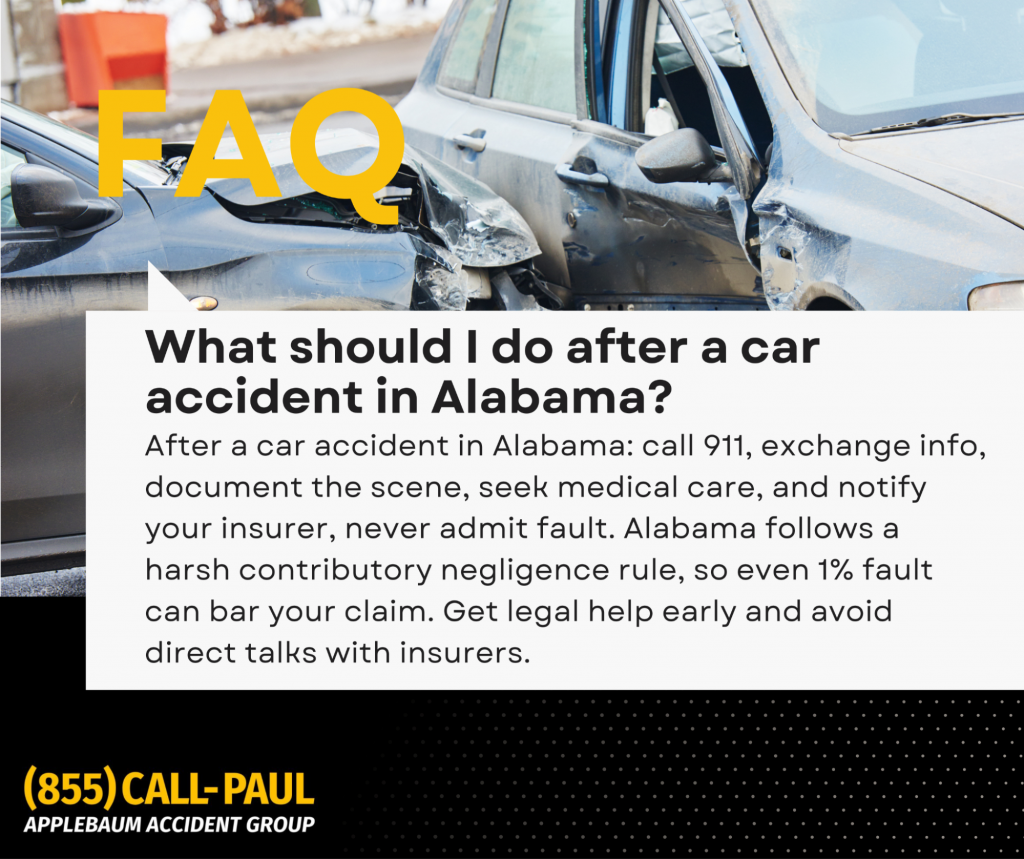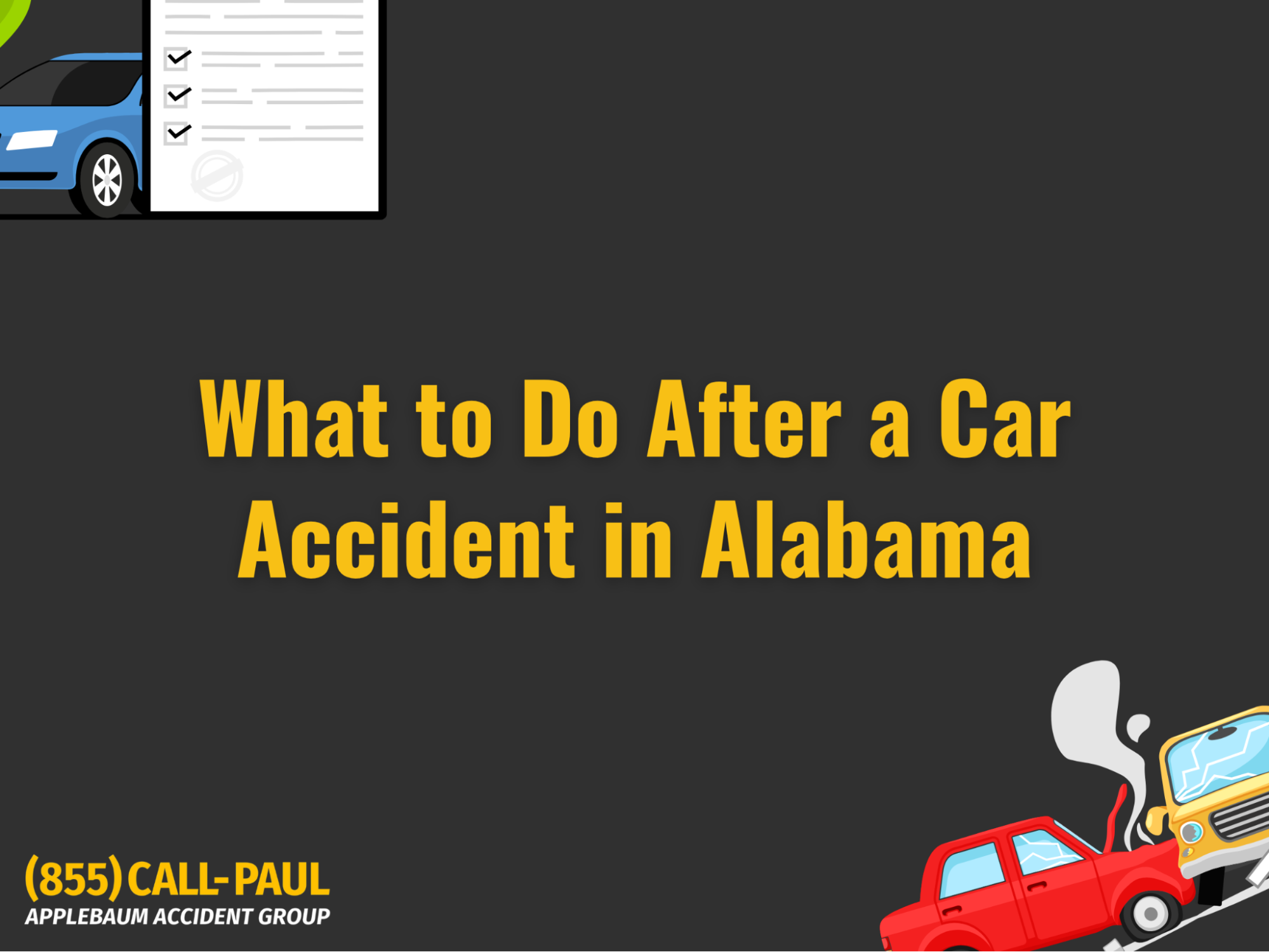After a car accident in Alabama: call 911, exchange info, document the scene, seek medical care, and notify your insurer, never admit fault. Alabama follows a harsh contributory negligence rule, so even 1% fault can bar your claim. Get legal help early and avoid direct talks with insurers.

Car accidents are traumatic, but in Alabama, the legal consequences can be just as painful if you make a mistake.
In this guide, you’ll learn the exact steps to take after an accident, how fault and insurance really work, the traps people fall into, and how to protect your rights from the very start.
Immediate Actions to Take at the Scene
What you do in the first few minutes after a crash can shape the outcome of your entire case. Alabama law requires all drivers involved in a collision to stop, assist, and exchange information, no matter how minor the damage appears.
- Stop and secure the scene. Move your vehicle out of traffic if it’s safe, but do not leave. Failing to stop can lead to criminal charges.
- Call 911. Ask for medical help if anyone is hurt and request a law enforcement officer to document the accident. A police report becomes one of the most critical pieces of evidence.
- Exchange details. Share your license, registration, and insurance info with the other driver. If they refuse or behave aggressively, let the responding officer handle it.
- Document everything. Use your phone to take photos of:
- Both vehicles and their damage
- Any visible injuries
- Skid marks, signage, and road conditions
- The position of each vehicle before they’re moved
- Do not admit fault. Even a seemingly harmless statement like “I didn’t see you” or “I’m sorry” can be twisted and used to deny your claim under Alabama’s strict liability rules.
- What if the officer won’t let us exchange info? If a responding officer prevents direct info exchange, stay calm and ask for the accident report number. It will include the necessary contact details and liability notes.
Do You Have to Report a Car Accident in Alabama?
Yes. If anyone is hurt or property damage exceeds $500, you must report the accident.
- If law enforcement arrives, they typically file the report on your behalf.
- If not, you are required to file a crash report with the Alabama Law Enforcement Agency (ALEA) within 30 days.
- Don’t skip this step. That report is your official version of events and can support your claim if the other driver changes their story later.
You should also request a copy of the police report within a few days of the crash. It will include officer observations, fault assessments, and whether citations were issued.
What to Do in the Hours and Days After the Crash
Even after the wreckage is cleared, your actions still matter. Some of the biggest case-damaging mistakes happen after the adrenaline fades.
- Get medical attention right away. Internal injuries and concussions often don’t show symptoms immediately. Delaying care can give insurers an excuse to downplay your injuries.
- Start an injury journal. Log how you feel each day, medications, doctor visits, and emotional strain. This can strengthen your claim for non-economic damages like pain and suffering.
- Report the accident to your insurer. Stick to the facts, time, date, location, and parties involved. Avoid speculation. Never speak to the other party’s insurer alone. Their adjusters are trained to elicit damaging statements.
- What if symptoms show up later? This happens more often than people think. But if you waited to seek care, the insurer might argue your injury isn’t crash-related. That’s why early documentation is key, even for minor discomfort.
Alabama’s Contributory Negligence Rule Explained
Alabama stands out as one of the few states with pure contributory negligence. This means that if you’re even 1% at fault, you may recover nothing.
To protect yourself:
- Avoid apologizing or theorizing about what caused the crash.
- Allow a qualified attorney to deal with both insurers.
- Do not post about the accident on social media. Photos of you smiling at a party a week later? They’ve been used to deny claims.
How Insurance Works in Not-at-Fault Accidents
If another driver causes a crash, their insurance is legally responsible for covering your damages. That’s how it’s supposed to work in Alabama, but reality often looks very different.
Here’s what you need to know:
- The at-fault driver’s liability coverage should pay for your injuries, vehicle damage, and other losses.
- But in many cases, drivers are underinsured, or they outright deny fault, even when it’s obvious.
- Your own policy may help, particularly if you have:
- Collision coverage, which pays to repair your car regardless of fault
- Uninsured/Underinsured Motorist (UM/UIM) coverage, which steps in when the other driver lacks adequate insurance
If you’re stuck footing the bill short-term while the insurers sort out fault, it doesn’t mean you’re at fault. It means Alabama’s process can be slow and messy.
Can You Sue? What’s the Timeline?
Timing is not flexible in Alabama. Miss a deadline, even by a day, and you lose your chance to seek compensation.
- Personal injury lawsuits (for medical bills, lost wages, pain and suffering) must be filed within 2 years of the crash.
- Property damage claims have a longer window, up to 6 years, but don’t wait that long if your car needs immediate repair.
- Insurance claims are often much more urgent. Some policies require you to notify them within 30 days of the incident.
Waiting too long can make you look unreliable or negligent, even if your injuries are real.
What Is the Average Car Accident Settlement in Alabama?
Alabama doesn’t have set payout charts, but case outcomes often follow patterns based on injury severity, documentation, and legal strategy.
Typical settlement ranges:
- Minor injuries (e.g., whiplash, bruises): $3,000–$15,000
- Moderate injuries (e.g., fractures, extended recovery): $20,000–$50,000
- Severe injuries (e.g., surgery, permanent impairment): $75,000 and up
Non-economic damages like pain, trauma, and loss of quality of life are more subjective, but they can greatly increase total payout when documented properly.
Factors that shape your final number:
- How severe your injuries are
- Whether you missed work or lost income
- How clearly fault is proven, or disputed
- Insurance coverage limits on both sides
- Whether your lawyer is known for going to trial
Settling without legal help often leads to lower offers. Insurance companies recognize when someone’s trying to “go it alone”, and they act accordingly.
Don’t Make These Mistakes After a Crash
Even a strong case can fall apart if you make decisions that undermine your credibility or the value of your claim. These are some of the most damaging missteps people make after a car accident in Alabama:
- Admitting fault at the scene. A quick apology can be turned into a confession.
- Skipping medical treatment. Gaps in care weaken your claim, insurance will argue you’re not really hurt.
- Settling too quickly. Some injuries take time to show. Once you sign a release, it’s over, even if you later need surgery.
- Trusting “friendly” adjusters. Their job is to protect the insurance company’s bottom line, not to help you.
- Failing to document symptoms. If it’s not written down, it didn’t happen. Keep a journal.
- Signing anything without review. You could be waiving rights you don’t even know you have.
When and Why to Hire a Lawyer
In Alabama, the law leaves no room for error. With the contributory negligence rule barring recovery if you’re even 1% at fault, a strong legal strategy is your shield.
Here’s what qualified legal representation can do for you:
- Handle insurance adjusters who are trained to reduce your payout
- Collect and preserve evidence before it’s lost or disputed
- Guard against quick, lowball settlement offers that waive your rights
- Ensure that both medical and property damage are addressed, not just the part that’s more profitable to litigate
Protect Yourself After a Crash in Alabama
If you’ve been in a car accident in Alabama, the system is not built to make things easy for you. Between harsh liability rules, confusing timelines, and pressure from insurers, one misstep can cost you everything.
You don’t need to navigate this alone.
You Focus on Recovery. We’ll Handle the Rest.

When you’re dealing with the fallout of a car crash, injuries, vehicle damage, and legal confusion, the last thing you need is more stress. That’s where Applebaum Accident Group steps in.
We connect accident victims with aggressive, proven attorneys who understand Alabama law and how insurance really works behind the scenes. Here’s how we help:
- We match you with lawyers who fight for full compensation, not just the easy claims
- We ensure your case gets personal attention from start to finish, including both injury and property damage
- We move fast so you’re not left waiting months for adjusters or answers
👉 Contact Applebaum Accident Group today and get matched with the legal help that takes you, and your recovery, seriously.





